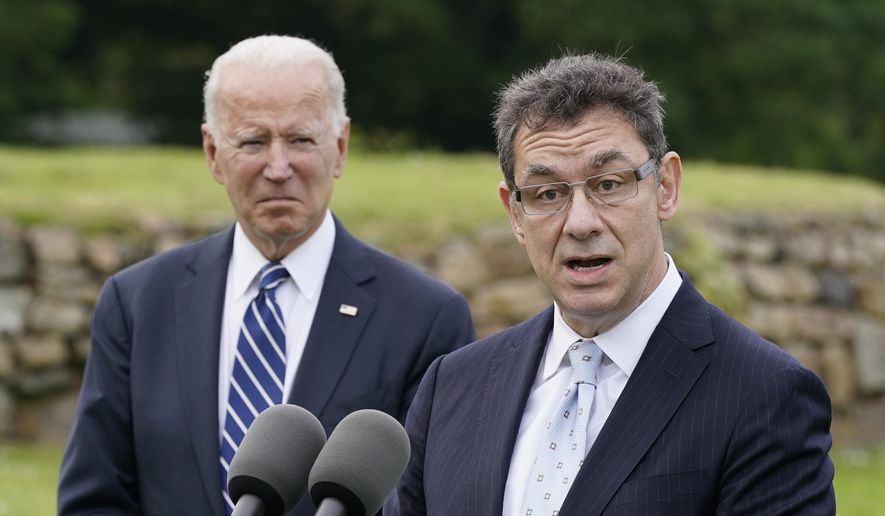Pfizer CEO Albert Bourla on Tuesday said people who deliberately spread false information about COVID-19 vaccines, often through sophisticated web operations, are “criminals.”
“They’re not bad people, they’re criminals, because they have literally cost millions of lives,” he said during a conversation with The Atlantic Council, a think tank specializing in international affairs.
Mr. Bourla, whose company teamed with German firm BioNTech on a leading COVID-19 vaccine, said there are two camps of regular people who are afraid — some are vaccinated and afraid of the virus, and some are holdouts who fear they will get side effects from the shots.
“Those I understand. They are very good people. They are decent people, they have a fear and I understand it. They don’t want to take chances,” Mr. Bourla said. “But there is a very small part of professionals who circulate on purpose misinformation so that they will mislead those that have concerns. Those people are criminals.”
Mr. Bourla spoke on the same day that U.S. Surgeon General Vivek Murthy put out a checklist for parents, teachers and other leaders to recognize mischief-makers and people who purposefully spread false information about the vaccines. It also details ways to approach relatives and others who seem to be drawn to bogus information.
“With the authorization of COVID-19 vaccines for children 5 to11 years old, it is more important than ever that families have access to accurate, science-based information. Health misinformation is spreading fast and far online and throughout our communities,” Dr. Murthy said.
Dr. Murthy’s guidance said some people spread false information for profit, while others simply feel like they found new information that others don’t know. His guidance tries to help people identify bad information, holding up examples that included distorted bar charts about vaccine uptake or outdated photos to make a point about masks.
The Kaiser Family Foundation this week said its polling data show some people continue to believe myths about the vaccines, including 8% who think the shots have been shown to cause infertility — another 23% aren’t sure — or that you can catch the virus from the shots, with 14% believing this and 10% unsure.
The vaccine from Pfizer-BioNTech was the first one to become fully licensed by the Food and Drug Administration. It is the most commonly administered vaccine in the U.S., and the first brand to win emergency approval for use in school-aged kids.
It was also the first COVID-19 vaccine approved on an emergency basis in December 2020 during the Trump administration, which supported efforts to develop the shots in record time under “Operation Warp Speed.”
Pfizer accepted federal money for pre-purchases of doses in mid-2020 but did its own research and development.
Mr. Bourla said Mr. Trump would check in from time to time to see if they needed anything.
He told the former president they were “moving full speed anyway ourselves, and I just needed to let my people work without worrying about politics.”
Pfizer announced promising results from its late-stage trial on Nov. 9, 2020 — six days after the presidential election.
“I know President Trump would [have] liked to see it before the elections,” Mr. Bourla said. “It came after the elections. It has nothing to do with politics, it’s just that was the speed of science.”
For more information, visit The Washington Times COVID-19 resource page.
• Tom Howell Jr. can be reached at thowell@washingtontimes.com.




Please read our comment policy before commenting.